There’s something undeniably magical about rainbows. These stunning arcs of color have captivated human hearts and minds for centuries, appearing as if by magic after a rainstorm and inspiring wonder across cultures and generations. Whether you’re an avid sky watcher or just someone who appreciates the little joys in life, learning about rainbows can brighten your day. In this article, we’ll explore ten fascinating facts about rainbows that are sure to bring a smile to your face and a sense of wonder to your heart. From the science behind their creation to the myths and legends they’ve inspired, these rainbow facts will remind you of the simple yet profound beauty of nature. So, let’s dive into the world of rainbows and discover what makes them so special, along with some fun pictures of rainbow cats to enjoy along the way…
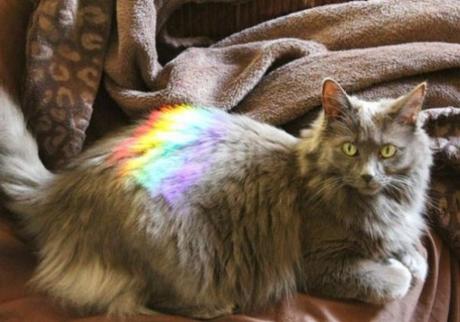
Fact 1: The Science Behind Rainbows
Rainbows are a result of the refraction, reflection, and dispersion of light in water droplets, creating a spectrum of light that appears in the sky. When sunlight enters a raindrop, it slows down and bends as it moves from air to denser water. The light reflects off the inside surface of the droplet, then refracts again as it exits, breaking into a range of colours. This natural phenomenon not only showcases the beauty of physics but also reminds us of the wonders of the natural world.
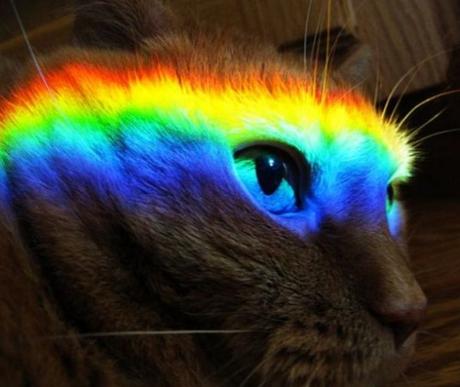
Fact 2: The Colours of the Rainbow
A rainbow typically displays seven colours: Red, Orange, Yellow, Green, Blue, Indigo, and Violet (often remembered by the acronym ROYGBIV). These colours appear in a specific order due to their different wavelengths, with red having the longest wavelength and violet the shortest. The vibrant and varied hues of a rainbow are a joyful reminder of the diversity and beauty of light.
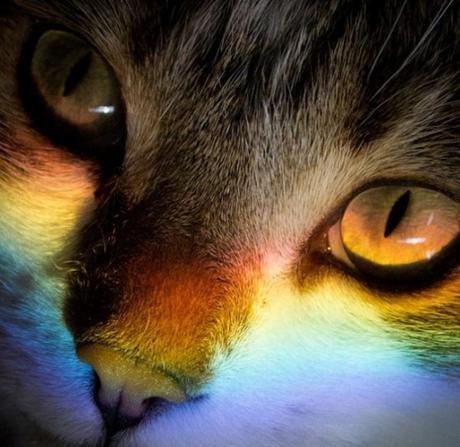
Fact 3: Double Rainbows
Occasionally, you might be lucky enough to see a double rainbow. This occurs when light is reflected twice inside a water droplet, creating a second, fainter arc outside the primary rainbow. The colours of the second rainbow are reversed, with red on the inner part and violet on the outer. Seeing a double rainbow is a rare and awe-inspiring experience, often doubling the joy of witnessing this natural wonder.
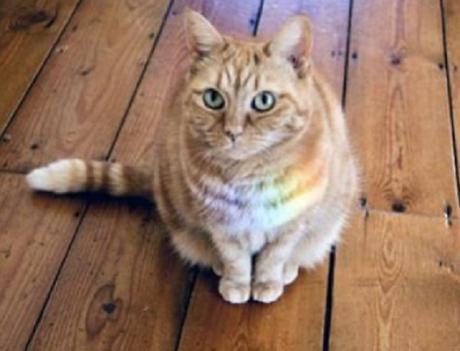
Fact 4: Rainbows in Mythology and Culture
Rainbows have held significant places in various mythologies and cultures throughout history. In Norse mythology, the rainbow bridge Bifrost connects Earth to Asgard, the realm of the gods. Irish folklore speaks of leprechauns hiding their pots of gold at the end of rainbows. Native American legends often view rainbows as sacred symbols. These stories highlight the universal fascination and joy that rainbows inspire across different cultures.
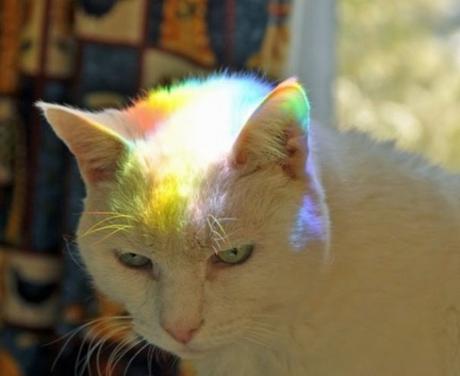
Fact 5: Moonbows: Night-time Rainbows
Rainbows aren’t just a daytime phenomenon. Moonbows, or lunar rainbows, occur when moonlight, rather than sunlight, refracts, reflects, and disperses in water droplets. Moonbows are much rarer than their daytime counterparts and often appear fainter due to the lower intensity of moonlight. The enchanting and rare nature of moonbows adds a touch of magic to the night sky.
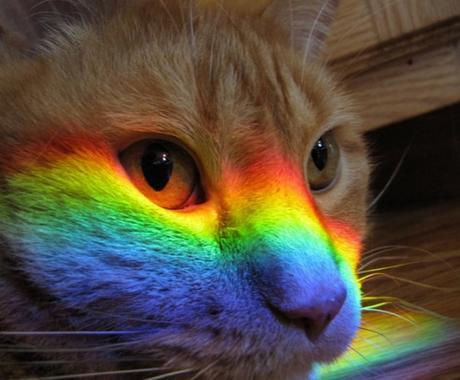
Fact 6: Rainbows in Art and Literature
Rainbows have been a source of inspiration for artists and writers throughout history. They appear in numerous artworks, from ancient frescoes to contemporary paintings. Literature, too, is rich with references to rainbows, symbolising hope, promise, and beauty. The enduring presence of rainbows in art and literature showcases their ability to inspire creativity and imagination.
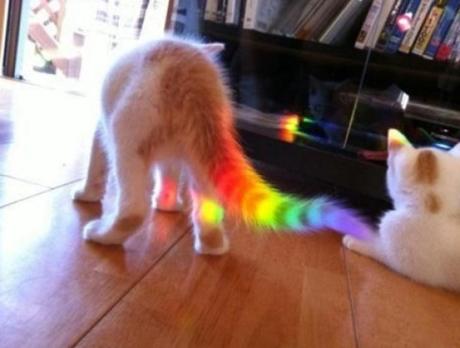
Fact 7: Rainbows on Other Planets
The possibility of rainbows on other planets is a fascinating topic for scientists. While Earth-like rainbows require water droplets, researchers speculate that similar phenomena could occur on other planets with different liquids. For instance, Titan, one of Saturn’s moons, has methane rain, which could potentially create methane rainbows. Imagining rainbows beyond Earth expands our sense of wonder and curiosity about the universe.

Fact 8: Personal Rainbows: Reflections and Sprinklers
You don’t have to wait for a rainstorm to see a rainbow. By using a hose or a sprinkler on a sunny day, you can create your own mini rainbow. Alternatively, holding a glass prism up to sunlight can produce a beautiful spectrum of colours on a nearby surface. These simple activities allow you to experience the joy of rainbows anytime and remind you of the everyday magic around us.
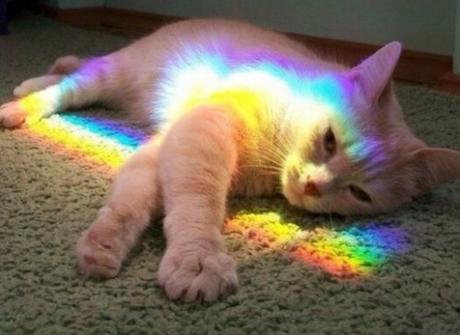
Fact 9: The End-to-End Illusion
Rainbows often appear as arcs, but they are actually full circles. The ground usually obstructs the bottom half, making them look like arcs. When viewed from an aeroplane or a high vantage point with the sun behind you, it’s possible to see a full circular rainbow. This optical illusion adds to the mystery and beauty of rainbows, making their sightings even more special.
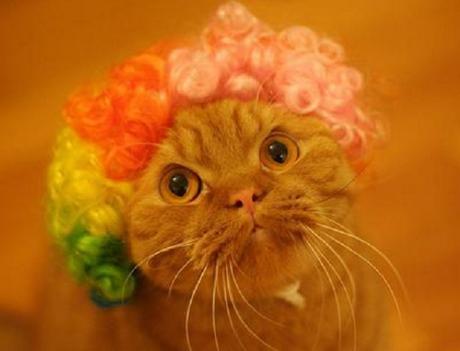
Fact 10: Rainbows as Symbols of Hope and Diversity
Rainbows have become powerful symbols in various social and cultural contexts. They represent hope, promise, and inclusivity. The LGBTQ+ community, for instance, uses the rainbow flag as a symbol of pride and diversity. During challenging times, rainbows often appear in windows and public spaces as symbols of hope and solidarity. Celebrating these positive and inclusive messages adds to the joy and significance of rainbows in our lives.
Rainbows are more than just a beautiful sight; they are a testament to the wonders of nature and the joy that simple moments can bring. From their scientific formation to their cultural significance, rainbows remind us to appreciate the beauty in our world and to find happiness in the unexpected. Whether it’s the vibrant colours arching across the sky or the rare appearance of a double rainbow, these natural marvels never fail to amaze and uplift us. We hope these ten interesting facts about rainbows have brought a smile to your face and a little extra joy to your day. So next time you spot a rainbow, take a moment to savour its beauty and let it remind you of the magic all around us. Thank you for joining us on this colourful journey, and may you always find rainbows in your skies!

